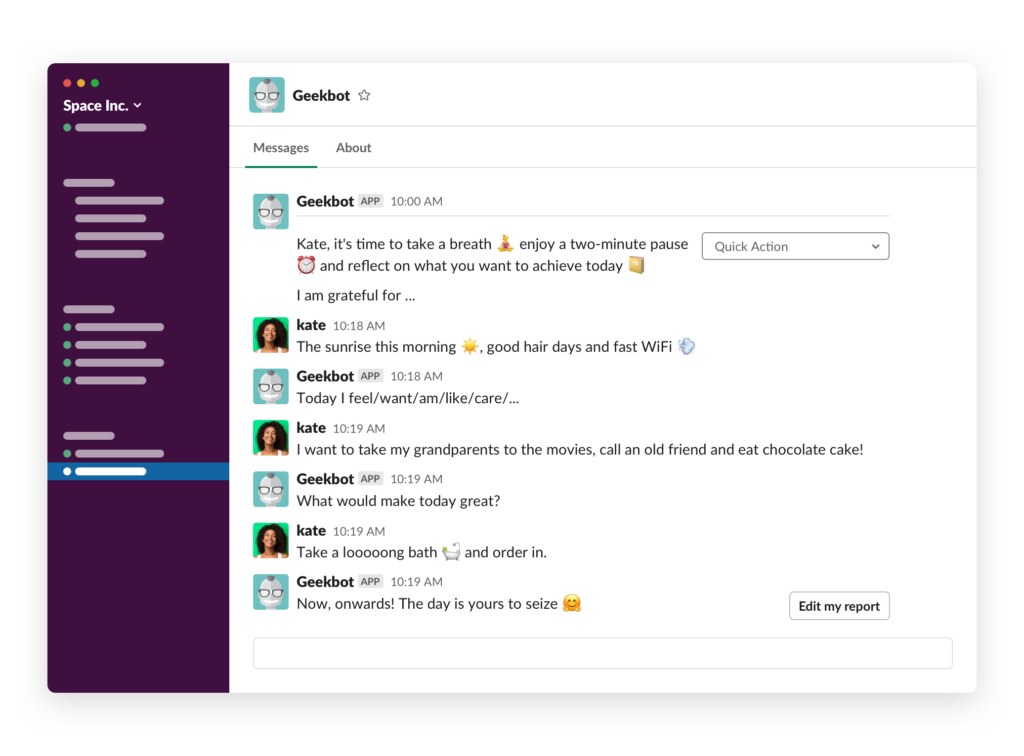According to multiple studies, taking time for daily reflection can significantly improve job performance in the long term and reduce stress.
However, simply taking the time to reflect is not enough – how you reflect and what you focus on are the critical factors that determine the success of the practice.
And with a busy work schedule, it can be challenging to find the time and space to reflect.
In this blog post, you will discover the power of daily reflections in the workplace, and share practical tips from the experts on how to make daily reflection an integral part of your work routine even on the busiest of days.
What Are Daily Reflections?
Reflection is defined as the process of expressing and organizing past experiences. This includes evaluating our assumptions and reactions to events, as well as contemplating the meaning and consequences of our experiences in a deliberate and persistent manner.
When we talk about reflections in the workplace, we usually refer to work-related experiences.
Here are just a few things we can reflect on in the workplace:
- Our productivity levels
- Our progress on tasks
- Our relationships with colleagues
- Our relationships with managers or subordinates
- How transparent we are in our communication
- How collaborative we are
But that’s a lot to reflect on at once! Worse yet, it’s too easy to trail off from specifics and get bogged down with vague and abstract theories.
That’s where daily reflections come into play. They allow us to stay focused on important topics and reflect on our immediate experiences.
Benefits Of Daily Reflections
Improve Your Performance
A study conducted by Harvard Business School showed that daily reflections in the workplace directly led to performance improvement.
A group of workers that had 15-minute reflections at the end of each day showed a 22.8% increase in work test performance compared to a control group that practiced no reflections whatsoever.
It’s worth noting that there was a third group of workers who practiced daily reflections and also added a practice of sharing their learning with peers. Interestingly, the performance in that third group was only slightly better than the group that did only reflections. That shows that, even on their own, daily reflections are a very powerful performance-boosting tool.
Become More Focused
Daily reflections help us focus on specific things that happened during the day.
For example, if you reflect on your whole month, your reflections will be valuable, but they will also be too vague as you will focus on big issues and forget lots of details.
With daily reflections, you can focus on improving specific issues that you identified during the day.
For example, instead of forming a vague idea of becoming a better communicator, you will remember the exact situation and context where that was important.
Become More Actionable
With daily reflections, you can easier formulate specific action items to help you improve.
Instead of writing “become a better communicator” you will be writing “present your daily standups update in under a minute.”
Analyzing specific examples (e.g. “I spent too much time explaining this thing today to my colleague”), we can generate action items to avoid certain issues or improve ourselves in the future.
Learning Hard Things Faster
Everyone knows that regularity in learning gets you further than intensity. For example, learning a new language in 10 minutes each day is more effective than spending an hour every week.
The same goes for daily reflections – devoting a small portion of every day to continuous learning will set you on a path of consistent improvement rather than random reflections throughout the year.
Daily reflections are especially helpful when your team goes through new experiences and navigates unknown, such as learning a new software tool or setting up a new project.
Hint: team reflections are also an extremely powerful practice for teams that want to take their communication and productivity to the next level.
Experience Less Stress In and Out of The Workplace
A workplace is a stressful environment. We have lots of tasks to juggle and never enough time to sort everything out. Workplace conflicts are a usual thing, and on top of that, we are constantly bombarded with unhealthy amounts of information we simply don’t have enough time to digest.
Studies show that a brief, end-of-workday positive reflection led to decreased stress and improved health.
Use daily reflections to reflect not only on areas of improvement, but also on positive aspects of your day, and you will be able to keep your workplace stress levels in check.
How to Conduct Daily Reflections
1. Set a Specific Time For Daily Reflections
Even though daily sessions are typically conducted at the end of your work day, it’s still important to set up a specific time so that you form a habit of conducting daily reflections and be less likely to skip them when something else pops up.
Set up an alarm on your mobile phone or use your work calendar to schedule a recurring event.
Alternatively, you can use a Slack or Microsoft Teams bot (such as Geekbot) that will remind you to reflect on your day and keep your reflections organized in a team messenger.
2. Answer Daily Reflections Questions
Prepare daily reflection questions beforehand. Use the same questions every day to give your daily reflection sessions structure.
Here are proposed questions to ask during your daily reflections:
- What are the most important events that happened today?
- What is something I could improve that happened today?
- What are the positive experiences I had today in the workplace?
- What’s the new thing I learned today?
- How can I improve my performance?
3. Write Down Replies
Write down answers to your daily reflection questions. To keep things interesting, you can start with a paragraph with your thoughts on the day and what you remember the most. Journaling is a valuable daily practice, so feel free to implement it as part of your daily reflections.
Writing down your daily reflections helps you keep a history of your improvements, clear your mind, and learn faster.
In addition, you can set a time to review your daily reflection notes every week or month to track your progress.
4. Automate Daily Reflections
Automating daily reflections with Geekbot can save you time and ensure that the process runs smoothly. Here’s how to automate daily reflections with Geekbot:
- Set up daily reflection questions: Decide on a set of questions that you want to ask yourself or your team every day. These questions should encourage reflection on the day’s work and progress toward goals.
- Configure Geekbot: In Geekbot, set up a new daily standup and add the reflection questions as part of the routine.
- Set up a schedule: Choose a time that works best for your team to receive the daily reflection questions. Then, set up a recurring schedule for Geekbot to automatically send the questions at that time every day.
- Review and adjust: Over time, review your responses to see what you’ve learned and how you’ve progressed. Adjust your daily reflections as needed to ensure that you’re continually growing and learning.
Tip: you can use Geekbot’s built-in Reflection Journal Template to kickstart your daily reflections. It already features reflection questions that you can edit to your preference.

Incorporating daily reflections into the workplace can have numerous benefits for both employees and the organization as a whole. By taking a few minutes each day to reflect on their experiences and learnings, employees can improve their self-awareness, boost their performance, and develop their skills.
Daily reflection doesn’t have to take a lot of time or be overly formal – even just a few minutes of quiet contemplation or discussion with colleagues can make a big difference. By making reflection a regular part of your work routine, you can gain valuable insights, develop your skills, and create a more productive and positive work environment.
Frequently asked questions
What are some benefits of daily reflections in the workplace?
Daily reflections in the workplace can help employees develop self-awareness, identify areas for improvement, improve their performance, and build more positive and productive relationships with their colleagues.
How can you make time for daily reflections in a busy work schedule?
To make time for daily reflections, try scheduling 5-10 minutes at the beginning or end of each workday, finding a quiet place to reflect, or integrating reflection into existing routines or activities like a daily commute or lunch break.
How can you encourage your colleagues or team members to practice daily reflections?
To encourage others to practice daily reflections, lead by example, share the benefits of reflection with your colleagues, and consider incorporating reflection into team meetings or setting aside time for group reflection activities. Encourage open and non-judgmental discussions to make it a safe space.



